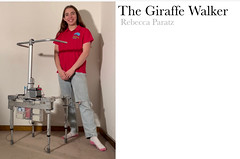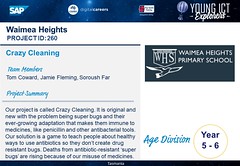Western Australia
Year 3 – 4
First Place
Automatic Icepack Dispenser
Elizabeth Colquhoun, Lola Turner, Bruce Jennings, Kale Bellot
Ashfield Primary School
Our team is making an icepack dispenser model which we hope to disperse around our school’s playground. Our aim is to help kids learn about their injuries so that they will know when it is important to ask for first aid or when their bodies will heal by themselves. We are also investigating how we can change our school’s policy on asking teachers in the staffroom for icepacks when we are injured because we want students to learn how to care for themselves when hurt. At the moment our team are researching how to create sustainable and reusable icepacks because our packs are made from zip-lock bags and end up in bins which go to the landfill where it pollutes our environment. Through this project we hope to educate kids about first aid, increase independence of students and help the environment by not littering.
Second Place
Moon System Chessboard
Julia Ford, Emily Kosovich
Perth College
The problem is that blind people who do not know braille or cannot afford a braille chessboard and want to play chess, cannot play. Also, people who are not blind who don’t understand the complexities of braille chessboard cannot play with people who are blind.
This problem is important to solve because chess is a board game played by 600-700 million that blind and non-blind people should be able to play together with ease, rich and poor.
A braille/moon system chessboard, with an AI voice that reads out the coordinates of the player’s move. Whilst Braille is a more commonly used alphabet for the visually impaired, the Moon System is another way of reading without sight, and uses a mix of curves, lines, and raised dots, and is slightly easier to learn and understand than Braille.
Third Place
Fluffybot
Anna Goode, Marlee Barry, Cora Jenkinson
Bertram Primary School
Fluffy bot is a mental health helper and friend who can talk to people about their problems. Fluffy bot is in the shape of a cuddly toy to make it feel like a safe person to talk to. Fluffy bot will use artificial intelligence to be able to talk to the owner about their problems and give them help. Fluffy bot is different from psychiatrists and psychologists because it can help to prevent problems, solve small problems before they get too big, and can give help to people who are too shy to get help in other ways.
Year 5 – 6
First Place
Unscam
Aaron Espiritu, Lachlan Cornwall
Padbury Catholic Primary School
Our project is a Website that has quizzes and games that help people become more familiar with scams. We found that children are not aware of all scams and we have designed our project to help awareness of scams.
Second Place
TENGY (triboelectric nanogenerator) Tile
Alex Bastian, Clem Chapman, Connor Poole, Edward Miles, Aaron Gibb
St Anthony’s School, Greenmount
Our team has chosen climate change as our problem to solve. Since most carbon emissions are from energy production, our team thought that lowering the amount of energy pulled from the grid would help the environment. Our project idea started when Alex and Clem both thought of creating electricity from footsteps. It turns out that some American scientists like Dr Zhong Lin Wang have already begun experimenting with friction energy generators called TENGs, which stands for triboelectric nano-generators. However, they have been focusing on creating wearable TENGs, like in shoes. We had the great idea of installing TENGs in floor tiles so that we get energy from the friction when a person steps on the floor – and so our solution idea – TENGY Tiles – was born.
Connor then suggested we create a working prototype using an EV3 robot. So we produced our own tile that, when pushed down, makes the overhead ceiling fan spin (showing how footsteps can be converted into electricity). Our TENGY Tiles could be installed in high traffic areas at busy 24-hour venues like airports and hospitals, because more pedestrian contact means more energy generated. We see the future for this idea to be sold world-wide as an alternative, sustainable electricity source and, one day, could potentially power whole buildings.
Watch a short video of our TENGY Tile
Third Place
Positive Pals
Lucas McCall, Sean Liem
Padbury Catholic Primary School
Positive Pals is an app that guides children ages 8-15 develop a positive effect on their mental illness.
It works in multiple ways including:
- sleep music as sleep is a beneficial part of your mental health
- breathing and meditation
- a weekly wellness check.
The app is made on scratch
We have tested the app and it works well.



